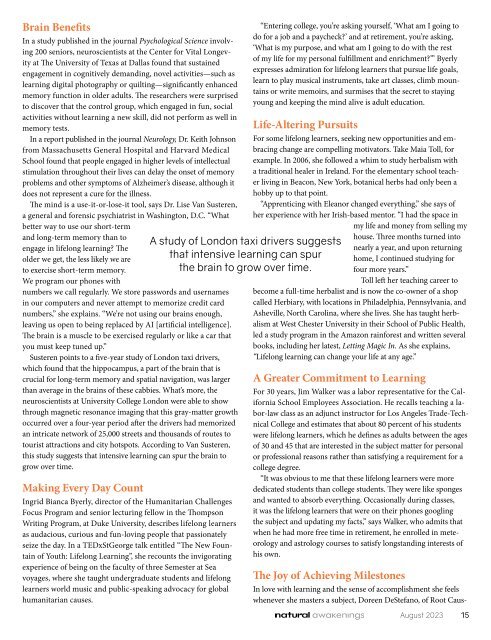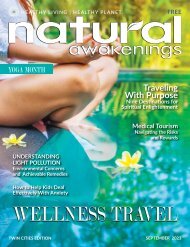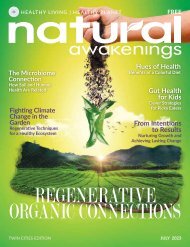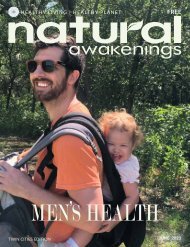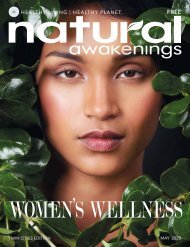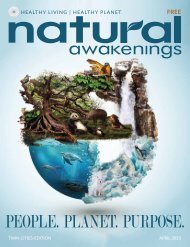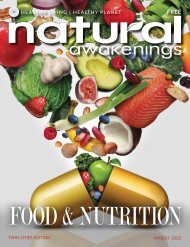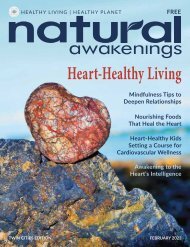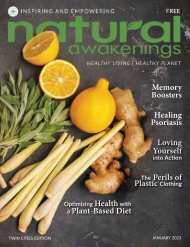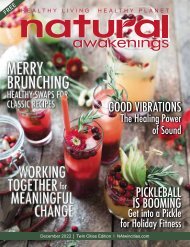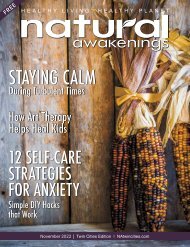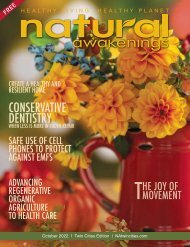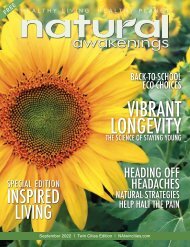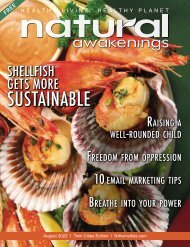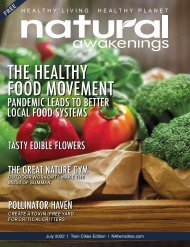Natural Awakenings Twin Cities August 2023
Read the August 2023 edition of Natural Awakenings Twin Cities magazine. This is our annual Self-Empowerment Issue featuring articles on stepparenting success, steps for successful school year transition, lifelong learning, mushroom for fun and health, letting nature heal itself, navigating food restrictions at school and so much more! Be sure to check out our local content, including News Brief announcements, Community Resource Guide with providers throughout the metro who can meet your individual wellness needs, and all the happenings in the Calendar of Events. There is additional online-only content that can be found at NATwinCities.com.
Read the August 2023 edition of Natural Awakenings Twin Cities magazine. This is our annual Self-Empowerment Issue featuring articles on stepparenting success, steps for successful school year transition, lifelong learning, mushroom for fun and health, letting nature heal itself, navigating food restrictions at school and so much more!
Be sure to check out our local content, including News Brief announcements, Community Resource Guide with providers throughout the metro who can meet your individual wellness needs, and all the happenings in the Calendar of Events. There is additional online-only content that can be found at NATwinCities.com.
Create successful ePaper yourself
Turn your PDF publications into a flip-book with our unique Google optimized e-Paper software.
Brain Benefits<br />
In a study published in the journal Psychological Science involving<br />
200 seniors, neuroscientists at the Center for Vital Longevity<br />
at The University of Texas at Dallas found that sustained<br />
engagement in cognitively demanding, novel activities—such as<br />
learning digital photography or quilting—significantly enhanced<br />
memory function in older adults. The researchers were surprised<br />
to discover that the control group, which engaged in fun, social<br />
activities without learning a new skill, did not perform as well in<br />
memory tests.<br />
In a report published in the journal Neurology, Dr. Keith Johnson<br />
from Massachusetts General Hospital and Harvard Medical<br />
School found that people engaged in higher levels of intellectual<br />
stimulation throughout their lives can delay the onset of memory<br />
problems and other symptoms of Alzheimer’s disease, although it<br />
does not represent a cure for the illness.<br />
The mind is a use-it-or-lose-it tool, says Dr. Lise Van Susteren,<br />
a general and forensic psychiatrist in Washington, D.C. “What<br />
better way to use our short-term<br />
and long-term memory than to<br />
engage in lifelong learning? The<br />
older we get, the less likely we are<br />
to exercise short-term memory.<br />
We program our phones with<br />
numbers we call regularly. We store passwords and usernames<br />
in our computers and never attempt to memorize credit card<br />
numbers,” she explains. “We’re not using our brains enough,<br />
leaving us open to being replaced by AI [artificial intelligence].<br />
The brain is a muscle to be exercised regularly or like a car that<br />
you must keep tuned up.”<br />
Susteren points to a five-year study of London taxi drivers,<br />
which found that the hippocampus, a part of the brain that is<br />
crucial for long-term memory and spatial navigation, was larger<br />
than average in the brains of these cabbies. What’s more, the<br />
neuroscientists at University College London were able to show<br />
through magnetic resonance imaging that this gray-matter growth<br />
occurred over a four-year period after the drivers had memorized<br />
an intricate network of 25,000 streets and thousands of routes to<br />
tourist attractions and city hotspots. According to Van Susteren,<br />
this study suggests that intensive learning can spur the brain to<br />
grow over time.<br />
Making Every Day Count<br />
Ingrid Bianca Byerly, director of the Humanitarian Challenges<br />
Focus Program and senior lecturing fellow in the Thompson<br />
Writing Program, at Duke University, describes lifelong learners<br />
as audacious, curious and fun-loving people that passionately<br />
seize the day. In a TEDxStGeorge talk entitled “The New Fountain<br />
of Youth: Lifelong Learning”, she recounts the invigorating<br />
experience of being on the faculty of three Semester at Sea<br />
voyages, where she taught undergraduate students and lifelong<br />
learners world music and public-speaking advocacy for global<br />
humanitarian causes.<br />
“Entering college, you’re asking yourself, ‘What am I going to<br />
do for a job and a paycheck?’ and at retirement, you’re asking,<br />
‘What is my purpose, and what am I going to do with the rest<br />
of my life for my personal fulfillment and enrichment?’” Byerly<br />
expresses admiration for lifelong learners that pursue life goals,<br />
learn to play musical instruments, take art classes, climb mountains<br />
or write memoirs, and surmises that the secret to staying<br />
young and keeping the mind alive is adult education.<br />
Life-Altering Pursuits<br />
A study of London taxi drivers suggests<br />
that intensive learning can spur<br />
the brain to grow over time.<br />
For some lifelong learners, seeking new opportunities and embracing<br />
change are compelling motivators. Take Maia Toll, for<br />
example. In 2006, she followed a whim to study herbalism with<br />
a traditional healer in Ireland. For the elementary school teacher<br />
living in Beacon, New York, botanical herbs had only been a<br />
hobby up to that point.<br />
“Apprenticing with Eleanor changed everything,” she says of<br />
her experience with her Irish-based mentor. “I had the space in<br />
my life and money from selling my<br />
house. Three months turned into<br />
nearly a year, and upon returning<br />
home, I continued studying for<br />
four more years.”<br />
Toll left her teaching career to<br />
become a full-time herbalist and is now the co-owner of a shop<br />
called Herbiary, with locations in Philadelphia, Pennsylvania, and<br />
Asheville, North Carolina, where she lives. She has taught herbalism<br />
at West Chester University in their School of Public Health,<br />
led a study program in the Amazon rainforest and written several<br />
books, including her latest, Letting Magic In. As she explains,<br />
“Lifelong learning can change your life at any age.”<br />
A Greater Commitment to Learning<br />
For 30 years, Jim Walker was a labor representative for the California<br />
School Employees Association. He recalls teaching a labor-law<br />
class as an adjunct instructor for Los Angeles Trade-Technical<br />
College and estimates that about 80 percent of his students<br />
were lifelong learners, which he defines as adults between the ages<br />
of 30 and 45 that are interested in the subject matter for personal<br />
or professional reasons rather than satisfying a requirement for a<br />
college degree.<br />
“It was obvious to me that these lifelong learners were more<br />
dedicated students than college students. They were like sponges<br />
and wanted to absorb everything. Occasionally during classes,<br />
it was the lifelong learners that were on their phones googling<br />
the subject and updating my facts,” says Walker, who admits that<br />
when he had more free time in retirement, he enrolled in meteorology<br />
and astrology courses to satisfy longstanding interests of<br />
his own.<br />
The Joy of Achieving Milestones<br />
In love with learning and the sense of accomplishment she feels<br />
whenever she masters a subject, Doreen DeStefano, of Root Caus-<br />
<strong>August</strong> <strong>2023</strong><br />
15


